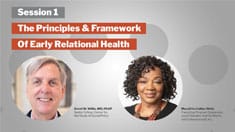Video
Perspectives on ERH Series: Session 1: The Principles and Framework of Early Relational Health
February 9, 2022
Related Areas of Focus: Health & Wellbeing

In the first session, David Willis, MD, Senior Fellow at the Center for the Study of Social Policy, is in conversation with MaryEtta Callier-Wells, Parenting Program Supervisor, Lead Educator and Facilitator at Self Enhancement, Inc., about the principles and framework of Early Relational Health. They discuss why Early Relational Health is essential to child and family well-being and what parents are telling us about the importance of creating and nurturing healthy early relationships.
For privacy reasons YouTube needs your permission to be loaded. For more details, please see our Privacy Policy.


